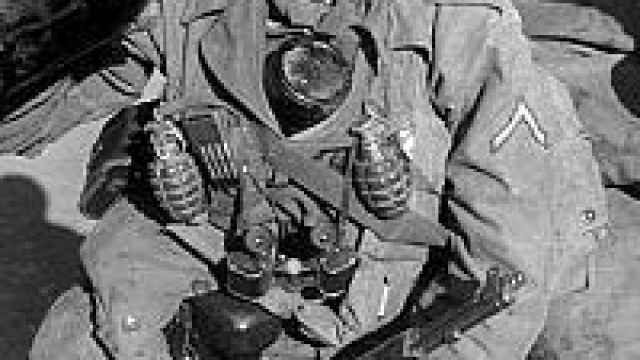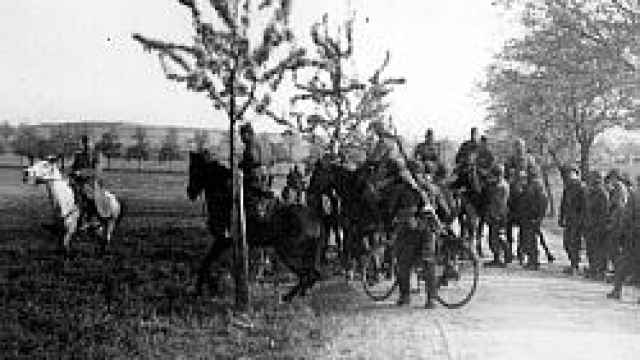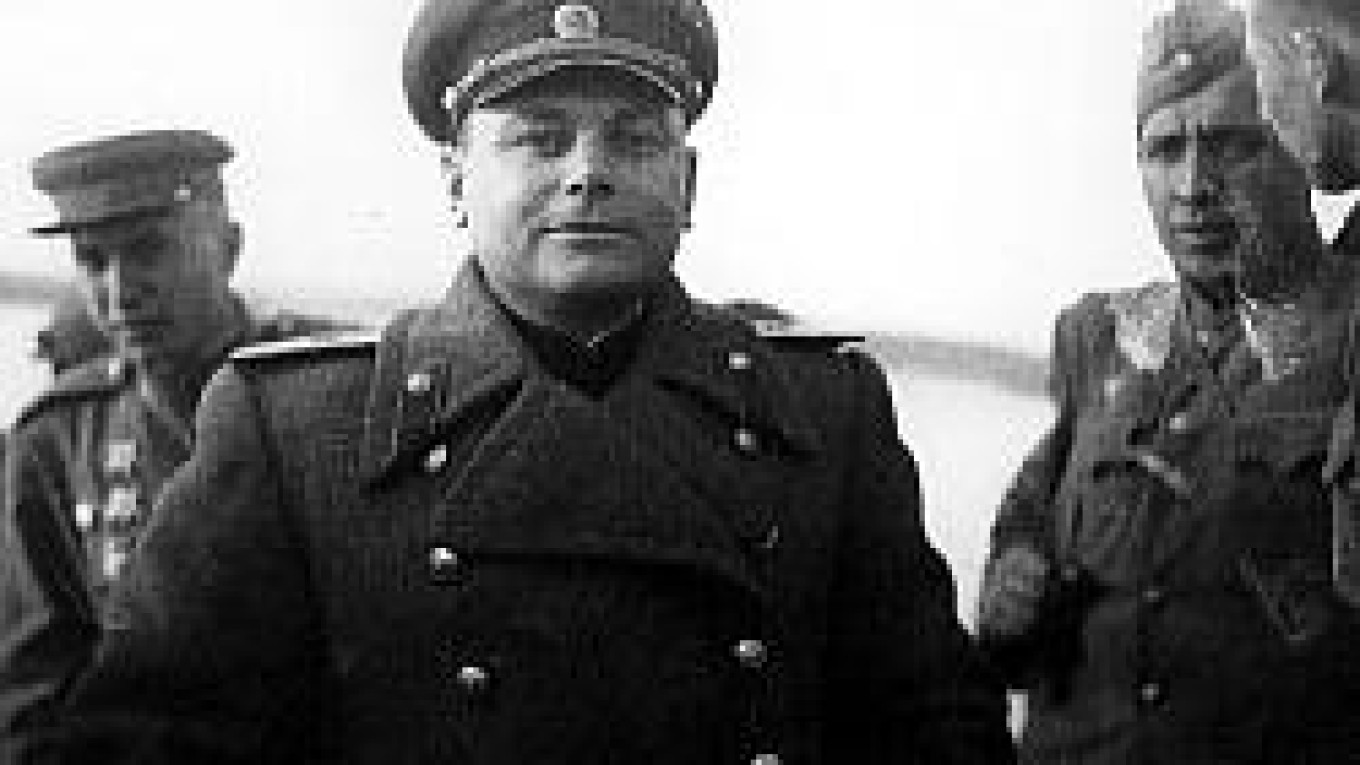First of all, he was a self-confident college kid -- "obnoxiously self-confident," he says -- so even though he was just a lowly private, he had no apprehensions about dealing with high-ranking officers of a foreign army.
Secondly, as the son of Russian immigrants, he was the only Russian-speaker in his 20-man U.S. Army patrol heading east to meet up with the Red Army, which was driving westward through Germany.
"Thirdly, I had a camera in my pocket," Belousovitch said. "It turned out to be the only camera on that patrol. ... I had the presence of mind to take a picture of those horsemen before we actually met."
It was late afternoon on April 25, 1945, and Belousovitch was with a jeep-mounted reconnaissance patrol that a half-hour earlier had received word that another patrol had made contact with Soviet soldiers from units positioned on the east bank of the Elbe River southeast of Berlin.
The U.S. patrol was about 150 meters east of the town of Clanzschwitz when the soldiers saw a Soviet cavalry unit traveling along a parallel, tree-lined road, and Belousovitch pulled out his camera and snapped the picture.
"We recognized each other immediately," Belousovitch said in an interview last week in Moscow, where he will stay through the 60th anniversary celebration of Victory Day on Monday.
Born in Shanghai in 1922 as the son of a White Army officer fleeing Soviet Russia, Belousovitch, together with his parents, Nikolai and Nadezhda, eventually landed in San Francisco, where he grew up. He started college at Berkeley, California, in 1941 and entered the Army two years later, joining the 69th Infantry Division, which officially took Leipzig on April 20, 1945.
After the Leipzig victory, Belousovitch's 273rd Infantry Regiment took up position on the Mulde River and with rumors of an imminent meeting of U.S. and Soviet forces, someone at headquarters recalled that there was a Russian-speaking private in the regiment, Belousovitch recalled.
"They let me stay at regimental headquarters in a comfortable villa," Belousovitch said. His jeep patrol headed out before dawn on April 25 for its historic mission.
The Soviet unit saw Belousovitch's patrol as well, and led by soldiers on bicycles and motorcycles, the horsemen made their way across the field to meet their American allies, making contact at 4:45 p.m.
"There was a lot of backslapping and hugging and smiles," Belousovitch said. "But of course, no one had the language."
 For MT Private Belousovitch in April 1945 | |
"The Americans said, 'Amerikansky'; the Russians said, 'Russky.' That was it. It was a historic moment, and everyone knew it. But no one could think of any deathless phrases. The only thing that sounded eloquent was the set speech of Pfc. Igor N. Belousovitch of Company E," he wrote.
To the Soviet senior lieutenant who first approached the patrol, Belousovitch said. "I greet you in the name of the American Army and our commanders on this historic occasion. It is a privilege and an honor to be here."
The Soviet officer responded by saying, "This is a historic occasion. It's a moment for which both our armies have been fighting. It's a great honor for me to be here. It is wonderful that we have met in this place. It is a moment which will go down in history."
The meeting lasted all of three minutes, in which time the Soviet soldiers showed the Americans how to get to the crossing point on the Elbe, Belousovitch said, where the Soviets had build a crude, hand-drawn pontoon ferry. The Soviets galloped off, saying they had orders to hurry to Dresden, while Belousovitch's patrol sped off to join the other U.S. patrols that were moving toward the Soviet position.
Within a few hours, the patrol made it to the crossing point, and the soldiers loaded their jeeps onto the ferry. After Soviet soldiers on the east bank pulled them across, the U.S. soldiers stepped onto the cobblestone bank, where they were greeted by the Soviet 58th Guards Infantry Division, led by General Vladimir Rusakov.
It was here, Belousovitch says, that he took his first step toward a career as a political officer in the State Department.
"I introduced my commander, Major [Fred] Craig, to the general, and I turned to the general to ask his name so I could introduce him to Major Craig," Belousovitch said. "I noticed a momentary expression of uncertainty on his face. And he looked sideways to a little fat colonel to his left, who wouldn't move away from him. I could see that colonel give him a slight nod. He was the general's political adviser. This was my first experience of the realities of Soviet life. Rusakov did not know if he could reveal his name."
Belousovitch said he had some reservations of his own and decided not to tell the Soviets that he was the son of Russian aristocrats who had fled the Communists after the October Revolution.
 Igor Belousovitch / For MT The Soviet cavalry unit linking up with Major Craig's patrol near Clanzschwitz. | |
The U.S. soldiers were invited to stay the night at the Soviet camp, where they were given copious amounts of alcohol.
Belousovitch said he had "a good-sized headache" the following morning, when his unit returned to its position on the Mulde, which in that region, runs parallel to the Elbe.
He describes the meeting of the Americans and the Soviets at the Elbe as "short and sweet" but also as an event that has followed him throughout his life.
He came to Moscow in 1976 for a two-year stint as first secretary of the political section at the U.S. Embassy, a job that entailed interacting with Soviet dissidents, including Andrei Sakharov.
At one point during his assignment, he was stopped by three "tough-looking men" who surrounded him as he was leaving an apartment complex reserved for foreign residents.
One of the men, after confirming he was a U.S. diplomat, began haranguing him about the dangers Soviet diplomats in New York were facing because of Soviet refusal to allow its Jewish citizens to emigrate.
The man had apparently done his homework on Belousovitch.
"The man told me, 'It's a shame that relations between our two countries have come to this,'" Belousovitch recalled. "'After all, we were allies once, we fought together.' And then he looked me straight in the eyes and said, 'We even met each other as friends at the linkup of our armies at the Elbe.'"
A Message from The Moscow Times:
Dear readers,
We are facing unprecedented challenges. Russia's Prosecutor General's Office has designated The Moscow Times as an "undesirable" organization, criminalizing our work and putting our staff at risk of prosecution. This follows our earlier unjust labeling as a "foreign agent."
These actions are direct attempts to silence independent journalism in Russia. The authorities claim our work "discredits the decisions of the Russian leadership." We see things differently: we strive to provide accurate, unbiased reporting on Russia.
We, the journalists of The Moscow Times, refuse to be silenced. But to continue our work, we need your help.
Your support, no matter how small, makes a world of difference. If you can, please support us monthly starting from just $2. It's quick to set up, and every contribution makes a significant impact.
By supporting The Moscow Times, you're defending open, independent journalism in the face of repression. Thank you for standing with us.
Remind me later.


